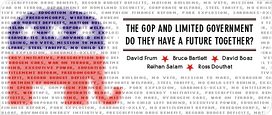David Frum says there’s not much disagreement, then calls me “hopelessly intellectually incoherent.” I guess I’d disagree with that. He’s right to be skeptical of opinion polls, though I would note that Americans also mostly vote against big government at the real polls. But of course they can only do that in some states, not at the federal level, so that doesn’t help us to constrain the federal government.
More importantly, though, Frum writes that “the libertarian project of fusing together limited government on the one hand and open borders, drug legalization, and gay rights on the other seems to me to be hopelessly intellectually incoherent.” This is classical liberalism, the philosophy of John Locke and Adam Smith that created the modern world. Liberalism, known these days as libertarianism, may be wrong, but it hardly seems fair to call it hopelessly incoherent.
Let me note first that I didn’t actually mention immigration in my article. And I didn’t mention gay rights or drug legalization, or urge Republicans to take up those banners; I did criticize Republicans for using federal power to override the decisions of the 50 states in the areas of marriage for people in love and marijuana for people in pain. One can believe in federalism without being happy about every exercise of state powers. But let that go; I’ll accept the views Frum attributes to me.
And if I did advocate all those positions in one article, I wouldn’t be proposing to “fuse” limited government and personal freedom; personal freedom is a part of limited government. In the liberal 19th century gay rights were hardly discussed (though the great Thomas Jefferson did try to reduce the penalties for homosexuality). But America prospered with open borders and no drug laws.
And we would again. Freedom works. Limited government works. It made America the richest country in the world, which is why people from all over the world have sought to come here from before 1776 to the present day. As liberalism spread, it brought freedom and prosperity to Europe and other parts of the world as well. Freedom means responsibility as well, a point that David Frum made eloquently in Dead Right. The limited-government agenda has to include a greater insistence on individual responsibility. But virtue and responsibility are better nurtured by freedom than by “statecraft as soulcraft.”
This program is certainly politically difficult, and made more difficult by a Republican government that feeds the public demand for more benefits rather than resisting it. That’s why institutional reforms like term limits and a balanced budget amendment should be part of a strategy for constraining government.

